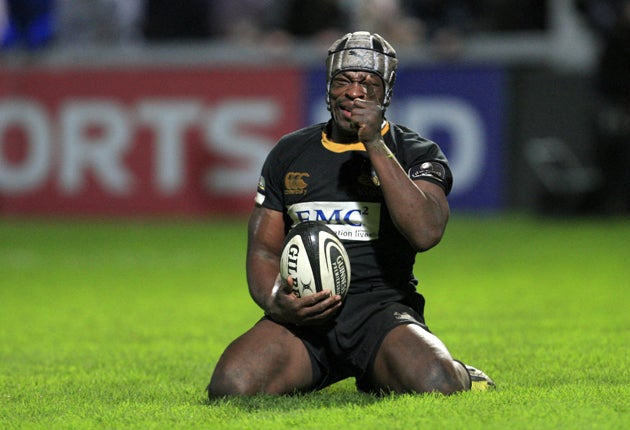Brian Ashton: Wasps abuzz with ideas for breaching defences
Tackling the issues

The Guinness Premiership has taken its share of criticism over the last few days, not least from the Wales coach, Warren Gatland, who went for the jugular by describing this season's tournament as the worst he'd seen since first coming to these parts from New Zealand.
I'm sure Warren has his own motives for beating this particular drum at this precise moment, but he's hardly alone in thinking that the level of rugby in England's top domestic competition is not setting the world alight.
Under the circumstances, then, it was invigorating to see Wasps – the very club Warren ran when he was making a very decent living out of the Premiership a few years ago – produce a dynamic, well thought-out performance of considerable quality in beating Gloucester at Kingsholm last weekend. By playing a game two or three times faster than the one Gloucester played, they did the sport a favour by proving that possession and territory, those sacred cows of the modern game, are not the be-all and end-all.
Kingsholm is hardly the fortress it once was; indeed, it seems more of a house made of straw these days, and I'll be very surprised if Wasps are the last side to win there this season. But more importantly for those of us who enjoy watching a challenging, imaginative brand of rugby, Wasps appear to have moved on in their mindset under the stewardship of Tony Hanks, another New Zealander who just happens to be one of Warren's long-time associates.
For as long as I can remember, Wasps have prided themselves on their iron defence – something that was again in evidence at Gloucester, even though the home side asked precious few questions of it. But the things that struck me were the many and varied elements of Wasps' attacking game. For a start, there were the constant changes of attacking focus: a minimum of two or three passes per phase, rather than the one-out ploys we see so often nowadays. There were constant changes of direction too, orchestrated from outside-half by David Walder, who to my mind is playing as well as any No 10 in the Premiership.
Off slow ball, the instinct was to pass wide to people running outside lines, thereby avoiding the heavy-duty collision areas. When things did come to a halt, the Londoners set up mini-mauls in open field and created situations from which forwards could spin free and break clear. Perhaps most pleasing of all, they initiated a good number of attacks in the No 13 channel, just as the best All Black teams do. I remember Jeremy Guscott, one of the best outside centres ever produced by England, telling me that he felt more exposed playing against New Zealand than against any other side for precisely this reason. Yet so few teams have the confidence and control to attack where the human traffic is least congested.
Wasps played a tempo-based game against a team playing a collision-based game and won hands down. By so doing, they slaughtered a couple of sacred cows badly in need of slaying. I'm not aware of the exact statistical breakdown of the match, but I wouldn't mind betting that Gloucester had an advantage in both possession and territory. The conventional wisdom says that dominance in these areas equals victory, but Wasps proved that there is more to rugby than that. Of course, possession and field position are important, but the pursuit of them as ends in themselves can be inhibiting. Wasps brought something else to the equation and they deserve to be congratulated for it.
Is there a whiff of the southern hemisphere about this tactical approach? Maybe. Hanks was working with the New Zealand provincial team Waikato when Wasps called him in last year, while the new forwards man, Trevor Woodman, cut his coaching teeth in Australia. I know Trevor of old and would unhesitatingly describe him as one of the most gifted ball-playing props to have represented England. There are clearly some rich ideas floating around, whoever is responsible for them. Given that London Irish and Northampton are also pushing back boundaries, I think I'll wait a little longer before dismissing the Premiership out of hand.
Put an end to 'monkey' business
Hooray for Simon Shaw. If I'm not the first to say that this year – everyone with British Isles rugby at heart took the greatest delight in watching his performances for the Lions in South Africa during the summer – I make no excuses for repeating the sentiment as a result of his comments on the gym culture now dominating the physical conditioning side of the game.
At long last, a player still operating at the elite end of the sport has voiced his concern about the production of "gym monkeys". Only a fool would deny the importance of getting players in the right shape, but conditioning is a cog in the wheel, not the wheel itself. I don't know too much about physiology, but it seems to me that some players are carrying more bulk than their frames can handle. Inevitably, injuries follow.
I ask you this: what contribution can we really expect "monkeys" reared in gyms to make to a dynamic, challenging brand of rugby?
Subscribe to Independent Premium to bookmark this article
Want to bookmark your favourite articles and stories to read or reference later? Start your Independent Premium subscription today.

Join our commenting forum
Join thought-provoking conversations, follow other Independent readers and see their replies